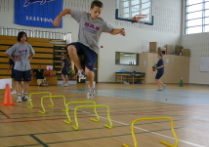Skills Testing

I have conducted research in a variety of kinesiology topics including coaching, physical education, sport and exercise psychology, and nutrition.
However, having become an established authority on male body image and in particular muscle dysmorphia, recent teaching experiences have given me a strong desire to apply my research skills and experience to the physical education setting. Specifically, I am concerned by the inability of some physical education-teacher education (PETE) students to model healthy behaviors and demonstrate motor skills necessary for delivering a quality physical education lesson.
If physical education teachers are unable to demonstrate basic skills required for sports, how are we to expect the students to be able to learn them? As a consequence, many students are only learning skills taught by their coaches, not the widespread skills necessary to engage in lifelong physical activity. A graduating student may be able to catch a ball, but they have never learned to kick or throw one. They may be able to run fast, but lack the motor skills necessary to hit a ball with a racket.
Eventually, as an alternative to fitness testing in PETE collegiate programs, I hope to develop an independent standardized skills test that could be used nationwide. Such an assessment would assist in ensuring that students nationwide are competent at modeling a variety of skills across multiple sports and activities, thereby providing a quality learning experience for future physical education students.
However, having become an established authority on male body image and in particular muscle dysmorphia, recent teaching experiences have given me a strong desire to apply my research skills and experience to the physical education setting. Specifically, I am concerned by the inability of some physical education-teacher education (PETE) students to model healthy behaviors and demonstrate motor skills necessary for delivering a quality physical education lesson.
If physical education teachers are unable to demonstrate basic skills required for sports, how are we to expect the students to be able to learn them? As a consequence, many students are only learning skills taught by their coaches, not the widespread skills necessary to engage in lifelong physical activity. A graduating student may be able to catch a ball, but they have never learned to kick or throw one. They may be able to run fast, but lack the motor skills necessary to hit a ball with a racket.
Eventually, as an alternative to fitness testing in PETE collegiate programs, I hope to develop an independent standardized skills test that could be used nationwide. Such an assessment would assist in ensuring that students nationwide are competent at modeling a variety of skills across multiple sports and activities, thereby providing a quality learning experience for future physical education students.
Modeling Health and Fitness as Educators
In the health fields, we know very little about whether positive and negative modeling of a healthy and fit lifestyle can impact learning of content and belief in what is being taught. Over the next few years, I plan on investigating whether a physical educator's physique, and the physiques of other disciplines such as nursing, coaching etc., impact student learning and impressions of the profession.
